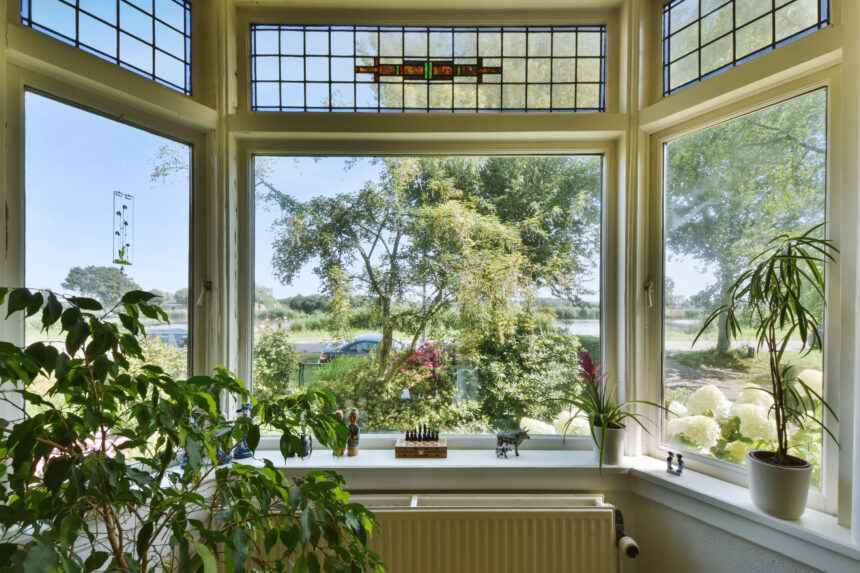Traditional windows can be a major source of energy loss in your home, driving up your utility bills and impacting your comfort, notes Keyrenter Richmond Management company. Upgrading to energy-efficient windows offers a powerful solution, bringing a range of benefits that go beyond just saving money.
Energy-efficient windows play a crucial role in enhancing home energy savings by minimizing heat transfer, improving insulation, and reducing the workload on heating and cooling systems. Here’s how these windows contribute to better energy efficiency:
-
- Reduced Heat Transfer: Energy-efficient windows are designed to minimize the amount of heat that passes through the glass. They feature multiple panes, special coatings, and gas fills that reduce heat transfer, keeping your home cooler in the summer and warmer in the winter.
- Improved Insulation: These windows provide better insulation compared to traditional single-pane windows. The multiple layers of glass, often separated by insulating gas like argon or krypton, help to maintain a consistent indoor temperature by preventing heat loss in the winter and heat gain in the summer.
- UV Protection: Many energy-efficient windows come with low-emissivity (low-E) coatings that block harmful ultraviolet (UV) rays from entering your home. This protects your furniture, flooring, and other interior items from fading and sun damage while also helping to reduce cooling costs.
- Reduced Energy Bills: This is the most significant advantage. Energy-efficient windows act like a thermal barrier, keeping cool air in during summer and warm air in during winter. This reduces the strain on your HVAC system, leading to significant savings on your energy bills. Studies by the Department of Energy suggest savings of 12% to 33% on heating and cooling costs, depending on your climate and the type of windows you replace. Additionally, knowing the best time to lock in natural gas rates can further optimize your energy savings, ensuring you get the most cost-effective and efficient setup for your home.
- Enhanced Comfort Year-Round: Energy-efficient windows help maintain a consistent and comfortable temperature throughout your home. In the summer, they block out the sun’s heat, preventing your home from becoming uncomfortably hot. Conversely, in the winter, they minimize heat loss, keeping your home warm and cozy. This translates to a more enjoyable living environment all year long.
- Reduced Environmental Impact: Energy-efficient windows contribute to a smaller carbon footprint by lowering your energy consumption. This not only benefits your wallet but also helps protect the environment by reducing greenhouse gas emissions.
Additional Advantages:
- Improved Noise Reduction: These windows often come with features that dampen outside noise, creating a quieter and more peaceful home environment.
- Increased Home Value: Energy-efficient windows are a sought-after feature by potential buyers, potentially boosting your home’s resale value.
The Ripple Effect: How Saving Energy Benefits You and the Planet
Saving energy isn’t just about lowering your bills (although that’s a pretty great perk!). It has a surprising ripple effect, impacting your wallet, your health, and the environment we all share. Here’s a look at the positive changes that come with using energy more wisely:
Financial Benefits
- Lower Utility Bills: This is the most direct advantage. By using less energy, you pay less for electricity, gas, and water.
- Increased Appliance Lifespan: Using appliances less and strategically helps them last longer, saving you money on replacements.
Health and Wellness
- Improved Air Quality: Reduced energy consumption from power plants means less air pollution. This translates to cleaner air for you and your family to breathe.
- A More Comfortable Home: Energy-efficient practices like using ceiling fans and natural light can create a more comfortable indoor temperature, reducing reliance on air conditioning and heating.
Environmental Impact
- Reduced Greenhouse Gas Emissions: Less energy usage means less reliance on fossil fuels, leading to a smaller carbon footprint and combating climate change.
- Conservation of Natural Resources: Saving energy translates to a reduced demand for resources used in power generation, like coal, oil, and natural gas.
- Protection of Ecosystems: Decreased reliance on fossil fuels helps protect delicate ecosystems from the harmful effects of resource extraction and pollution.
Beyond Your Home
The impact of saving energy extends beyond your individual household. By adopting energy-efficient practices, you contribute to a collective effort towards a more sustainable future. This can inspire others to follow suit, creating a positive ripple effect throughout your community.
Small Changes, Big Impact
Even minor adjustments in your daily routine can make a significant difference. Turning off lights in unoccupied rooms, unplugging unused electronics, and switching to energy-efficient appliances are all simple steps with far-reaching consequences.
By making smart energy choices, you’re not just saving money – you’re taking a stand for a healthier planet and a brighter future for generations to come. So, let’s all be a part of the solution and embrace an energy-efficient lifestyle!
Making the Switch:
There are various types of energy-efficient windows available, each with its own benefits and price points. Consulting with a qualified window contractor can help you choose the right option for your home and budget. Remember, while the initial investment may seem significant, the long-term savings on energy bills and the increased comfort they provide make them a worthwhile investment.
Invest in energy-efficient windows and enjoy a more comfortable, energy-saving, and eco-friendly home!


